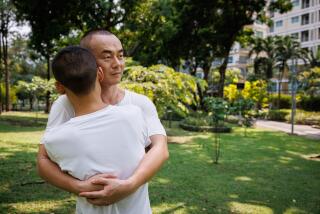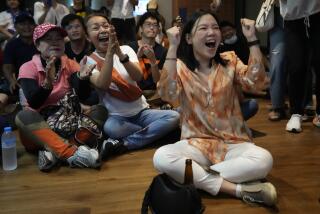Thailand’s Economic Expansion Widens Gap Between Rich and Very Poor
- Share via
BANGKOK, Thailand — Across the street from the Thai prime minister’s air-conditioned offices, more than 3,000 jobless farmers huddled under tarps and fanned themselves in the midday heat.
They came from all corners of the kingdom to make a last-ditch protest against the government’s confiscation of lands some of them have tilled for generations.
The villagers, calling themselves the Forum of the Poor, camped on straw mats next to a foul, mosquito-infested canal. A few steps and a world away, wealthy Thais streaked past in shiny Volvos and Mercedes, heading toward a skyline jagged with construction cranes atop soon-to-be-finished office and apartment buildings.
“How come the city people have such a good life and we’re so poor?” asked protester Rabieb Kammai. “We’re all the same. We’re all human beings.”
Rabieb’s bitterness reflects the plight of many Thais left behind in their nation’s race to join the ranks of East Asia’s newly industrialized economies.
Hailed by some analysts as the region’s next economic tiger, Thailand posted an average annual growth rate of 8.2% in each of the last 10 years--the fastest growth rate in Asia and one of the fastest in the world, according to the World Bank. Thailand’s evolution from a farm-based economy into one driven increasingly by exports of manufactured goods has brought unprecedented wealth to an expanding, mostly urban middle class.
But a large number of Thais have seen little if any benefit from this pell-mell growth. For them, the country’s boom has meant severe environmental problems and a yawning gap between rich and poor. Some analysts question whether Thailand can--or even should--try to keep up the feverish economic pace of the past decade.
“To me it’s not growth at all because monetary growth doesn’t take into account social costs or the loss of nonrenewable natural resources,” said Saneh Chamarik, director of the Local Development Institute, a nongovernmental group.
Thailand’s boom began in the mid-1980s, when Japanese investors arrived in search of cheaper places to build manufacturing plants.
Encouraged by the government’s pro-business policies, foreign investment increased 12 times over the next 10 years, and by 1993, a new Japanese factory was scheduled to open in Thailand every three days, say Pasuk Phongpaichit and Chris Baker, authors of the economic study, “Thailand’s Boom!”
Local business people quickly climbed on board. The value of corporate securities traded on the Stock Exchange of Thailand ballooned from $612 million in 1985 to $80.7 billion last year.
Per-capita income doubled to $1,215 during the same period.
Most of the new wealth has flooded into the cities, especially the capital, Bangkok. Urban Thais have amassed fortunes in construction and real estate speculation. Yuppies dine at McDonald’s and do deals over gold-plated cellular phones.
Thailand is now the second-biggest market in Asia for Mercedes-Benz. Sales soared from 1,000 cars in 1985 to more than 13,000 last year.
“I’d love to have all these things, but I don’t think about it too much,” said Malai Klinkajon, a food vendor’s wife living in Klong Toey, Bangkok’s biggest slum.
“I know I’m poor,” she said. “I can’t change that.”
Although the recent economic surge has lifted some Thais out of poverty, many have seen little change in their fortunes.
In 1985, the richest fifth of the population earned 10 times more than the poorest fifth. Ten years later, the gap had widened to an 18-fold difference in incomes.
Regional disparities are also huge. In northeastern Thailand, the poorest part of the country, last year’s average per-capita income was $667. In Bangkok, it was $3,059.
Deforestation and industrial pollution have worsened as the government does little to enforce laws to protect the environment. Political rivals trade charges of involvement in illegal logging. Commercial shrimp ponds ruin coastal farmlands and valuable mangrove swamps.
The government, trying to help modernize the country, has also upset the poor as it confiscated land for infrastructure and irrigation projects and administrative buildings.
Bangkok, with its chronically choked highways and filthy, lifeless waterways, continues to expand. Office workers leave for work before dawn to beat the city’s traffic jams. Rural families splinter as husbands and sons drift here to seek higher-paying jobs.
“Only the old people stay in the villages. The younger people all come to Bangkok to sell their strength,” said Boonsri Reu-ard, a laborer from northeastern Ubon Ratchathani province.
Migrants like Boonsri often end up working for a minimum daily wage of $5.80 in sweatshops and factories where employee safety is almost an afterthought. Blocked fire exits at a foreign-owned toy factory contributed to the deaths of 188 workers, mostly women, in a blaze in 1993.
Analysts see few signs that the government is tempering its emphasis on unbridled, export-led growth despite the worsening bottlenecks.
But as the Forum of the Poor protesters showed, those paying the dearest price for growth are less likely to stay silent.
More to Read
Sign up for Essential California
The most important California stories and recommendations in your inbox every morning.
You may occasionally receive promotional content from the Los Angeles Times.













